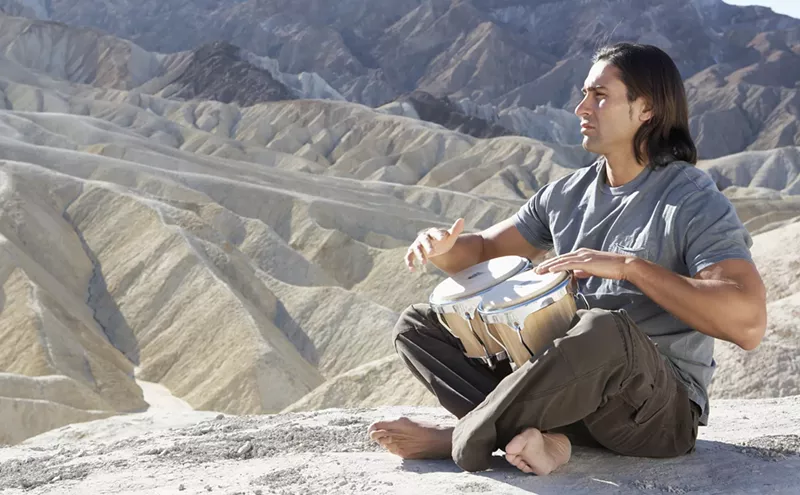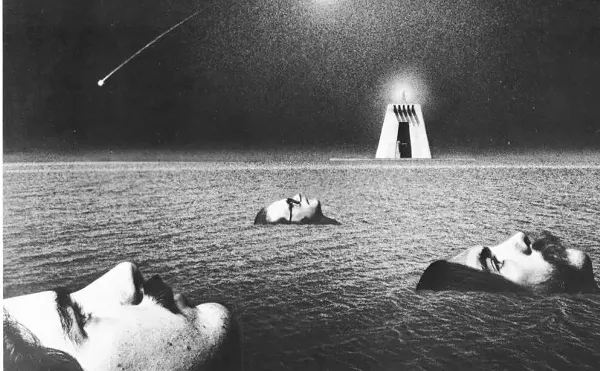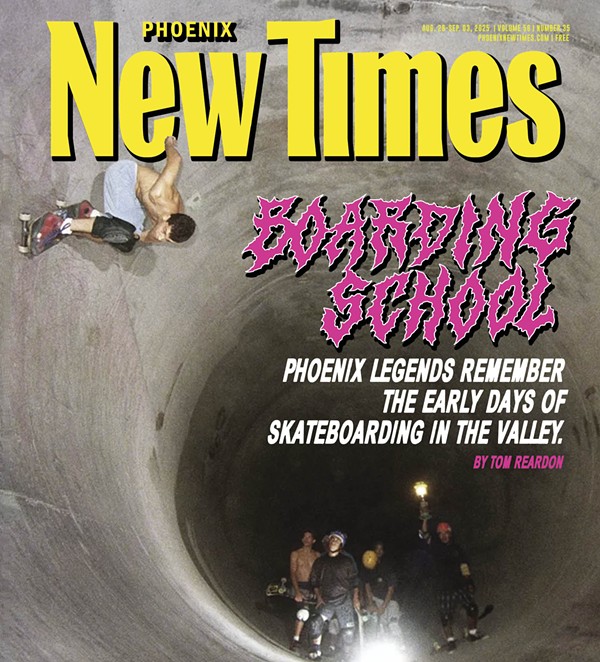It should be noted that Zach Lind's wistful recollections fall a bit short of ancient history. The guy's only 20 years old. Those misty days of yore he talks about were last summer.
But things have changed for Jimmy Eat World. The precocious underground/indie band is now learning to live life as a major-label act. Lind and his cohorts--guitarist Tom Linton, bassist Rick Burch and singer/guitarist Jim Adkins--now have a debut CD, Static Prevails, recently released on Capitol Records, and the fledgling big-timers just completed a minitour with shows in San Francisco, Denver and St. Louis, along with a gig at a Chicago music festival and a stop at that city's Hard Rock Cafe. Gone are those spontaneous, pressure-free days of playing touch and go with happenstance. Amateur hour is over.
"Yeah, it's a lot different," Lind says. He's speaking from a rest stop in central Illinois as the band makes its way from Chicago to a show a couple of days ahead in Dallas. Lind says the new, professional way of doing things has its drawbacks. "But that's mostly because we're still adjusting."
Among the adjustments is an understanding that things aren't quite as cozy in the fast lane as they are in the underground.
"We have a network of friends around the western United States," Lind says, "and when a friend does a show for you, it's cool, because they're really into it. But a lot of times when you have a booking agent or a promoter, you don't really have any contact with them. It's not like they don't try as hard, it's just that they don't really know you. There isn't the connection you have with a young punk-rock kid putting on a show. We felt like we used to have people working for us. We still do, but it's more a feeling like we're basically on our own."
The band's anxieties at playing away from home under a new set of rules are understandable, seeing as how no one in Jimmy Eat World is over the age of 21. There's a tinge of postadolescent awe in the way Lind talks about how quickly the band went from playing backyard parties to Hard Rock Cafes. There's a similar sense of kid stuff in the way Lind eagerly offers homespun historical vagaries that most jaded rockers avoid. (Sample: "Jim and I went to Mountain View High School," he notes. "Rick and Tom went to Westwood. So, you know, we have that rivalry thing going.")
Schoolboy loyalties notwithstanding, Lind, Adkins and Linton formed Jimmy Eat World a couple of years ago. Lind and Adkins were childhood chums who cut their rock 'n' roll teeth in typical suburban fashion. "We played Metallica and Van Halen songs in my garage," Lind says. "You know, stupid stuff that young kids like to do." Jimmy Eat World eventually evolved, with the band's first recorded vital sign, a four-song seven-inch put out by a couple of friends on their Wooden Blue label. The response to the disc, says Lind, was encouraging. "It got us thinking that people might really like us."
It didn't take long for the band to find out Capitol Records liked it, too.
"That was a total surprise," Lind says of the label's initial interest. "We'd been called by a couple of majors, but it was nothing serious at all. It was like, 'Send a tape,' whatever. But the Capitol thing came out of the blue. We played a big benefit at the Nile Theater for a guy who got into a scooter accident, and someone from Capitol just came to the show. He saw us and liked us, and it kind of went from there."
But a speed bump slowed the Jimmy Eat World joy ride. It involved the band's original bassist, a young man who found himself faced with a momentous, life-altering decision, a choice that would definitely determine his future with the band. It was a curious and a distinctly Mesa-like quandary.
"He had to go on a mission," Lind says of the Mormon bandmate. "He had to make a decision to stay with us or go, and he decided to go. It was an odd situation, but it ended up okay. He did what he wanted to do, and we ended up with Rick, who's worked out really well. It could have been really ugly, but it turned out not so bad."
Something that didn't turn out well was a more rockerlike crisis involving Linton. With the bass player predicament solved and the band set to go on its premier tour as Capitol recording artists, Linton shoved the machinery into pause by suddenly turning into an uncharacteristically aggressive knucklehead.
Specifically, the guitarist broke one of his knuckles. On someone's head.
"Well," says Lind with noticeable hesitation, "it was a girlfriend thing. It was at a party and some guy who was seeing the same girl got a bunch of his friends to gang up on Tom. So Tom just started kicking ass. He turned into a regular Jean-Claude Van Damme."
He also kept the band sidelined until his hand healed. Capitol was not amused.
"They really didn't say anything," Lind says. "But they didn't have to. It was evident."
Capitol apparently is far more pleased with Static Prevails. There's word the label plans to push the CD as a nuthin'-fancy, do-it-yourself-sounding disc that echoes back to the indie/underground of the '80s. And the CD's best songs--the melodic "Robot Factory," the propulsive "Seventeen" and the ambitious, seven-and-a-half-minute "Digits"--do come off like throwbacks to music on Homestead or Twin/Tone or one of the other independent labels that once ruled college-radio playlists. Adkins sings with an obvious Westerberg-inspired urgency, and the rest of the band grinds out the kind of controlled noise that defined the pregrunge, postpunk sounds of American bands in the Reagan years.
It's a sound that's helped Jimmy Eat World cultivate a young, sturdy following on the local alterna-rock scene, with Static Prevails reportedly selling well at mom-and-pop record stores like Stinkweeds and Eastside. Still, Jimmy Eat World hardly carries the buzz the Gin Blossoms, Refreshments or even Dead Hot Workshop generated before signing their respective recording deals. Lind figures his band's relative anonymity is due in part because Jimmy Eat World never tried to wriggle into any certain scene in town.
"Until now we've basically been an underground band in the East Valley," Lind says. "We just played shows with bands we liked from other cities that were passing through. We were kind of lazy in a way, but then again we never sold out to Gibson's or Long Wong's because that was never really important to us. It's not like we tried to avoid those places. I just don't think they were ever really interested in us."
Jimmy Eat World is scheduled to perform a free concert on Thursday, August 8, at Nile Theater in Mesa. Showtime is 8 p.m.












